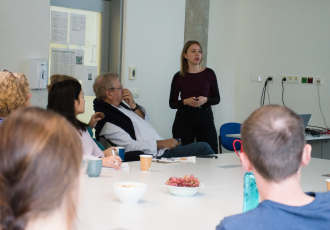31. Jan. 2024
CEITEC has interdisciplinarity and collaboration, among other things, in its DNA – these two "molecules" are reflected in most of its activities for good reason – no excellent science can do without sharing knowledge or technologies from other disciplines, and certainly not without a broader scientific or support team. This is why scientists and administrators at CEITEC Masaryk University (MUNI) have been collaborating for three years with colleagues from the University of Edinburgh, the European Molecular Biology Laboratory (EMBL) in Heidelberg, and Johannes Gutenberg University (JGU) and the Institute of Molecular Biology (IMB), based in Mainz. This is thanks to the INTEG-RNA project funded by the Twinning grant call of the European Horizon 2020 programme. The coordinator of this project was the research group leader, Prof. Mary Anne O´Connell from CEITEC MUNI in Brno.
The TWINNING grant call has “pairing” right in its name, so it is not difficult to deduce that its essence is to connect partner institutions in an international environment to share good practice, inspire each other and learn from each other. This is done through educational workshops, conferences, summer schools and professional exchanges, internships and consultancy.
CEITEC MUNI has been involved in the Integration of RNA Biology for Next-Generation Scientists (INTEG-RNA) project in a consortium with the above-mentioned partner institutes and the mutual cooperation started on January 01, 2021. The main objective of the consortium was to develop, strengthen and implement the techniques and unique expertise possessed by the partner institutions in the field of RNA biology as well as in research management and project support.
Ribonucleic acid (RNA) is a key element of all living organisms as it is involved in the transfer of genetic information, among other things, and thus plays an important role from medicine to biotechnology to agriculture. CEITEC scientists have used the grant funding primarily to enrich the topic of RNA in general with new approaches, insights and knowledge, as they themselves have an excellent reputation in this field.
In the laboratories of the Institute of Molecular Biology in Mainz, for example, plant nuclear extracts from Arabidopsis thaliana seedlings were analysed by mass spectrometry and subsequent in vitro experiments led to the identification of three putative binding proteins. The iCLIP method (individual-nucleotide resolution crosslinking and immunoprecipitation method) has also been optimised, providing scientists with an accurate picture of which proteins associate with specific parts of RNA molecules, which is crucial for understanding various cellular processes and gene functions.
Significant advances have also been made in the analysis of prostate cancer thanks to grant funding – scientists have successfully combined two techniques (spatial transcriptomics and PET-MRI imaging), allowing them to obtain more detailed information about the tumour microenvironment at the cellular level in the spatial context of the tissue.
Thanks to the acquired expertise, the CEITEC team of scientists subsequently developed an innovative tool "SpatialPath", available at http://cfb.ceitec.muni.cz/spatialpath, which allows to identify and highlight key genes in transcriptionally resolved tissue specimens and can compare multiple samples.
While CEITEC MUNI has excellent science in its DNA, it also prides itself on its cutting-edge research management and excellent technological background. That is why the grant project included education, inspiration and networking between science administration and research management staff. One of the key topics was staffing processes, PhD and postdoctoral programmes, and a joint hybrid retreat played also an important role, providing a broad perspective on administrative processes, grant management and working with alumni, and the possibilities of using AI in scientific recruitment.
However, the most valuable outcome of the three-year project was the establishment of personal relationships, mutual understanding between researchers and administrative staff, and mutual professional enrichment that will lead to further collaboration.


 Share
Share








